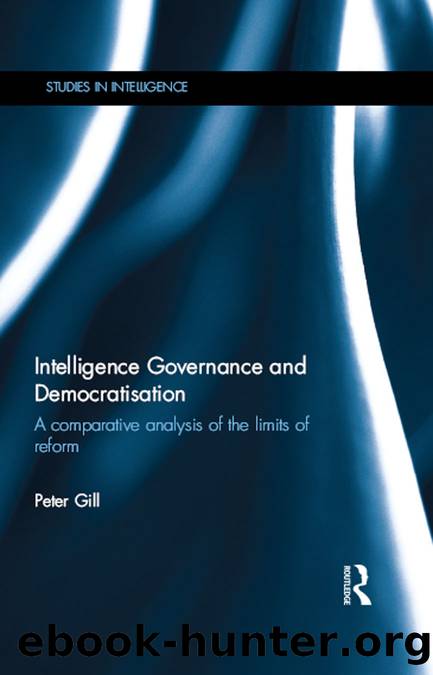Intelligence Governance and Democratisation: A Comparative Analysis of the Limits of Reform by Peter Gill

Author:Peter Gill [Gill, Peter]
Language: eng
Format: epub
Tags: Political Freedom, Political Science, Comparative Politics, Security (National & International)
ISBN: 9781317541806
Google: qDEFDAAAQBAJ
Goodreads: 30001505
Publisher: Routledge
Published: 2016-04-20T00:00:00+00:00
5 Explaining democratisation 1
Transnational factors
Introduction: do as we say, not as we do?
The change process needs to be analysed at different social and political âlevelsâ. This is a common device in social science and there are four main levels relevant to this analysis, in descending order of generality: the international context; national politics and the form of the state; intelligence agencies and their location in state, corporate and community sectors; and, finally, how intelligence work is done within individual agencies. This has been used to analyse overall democratisation1 and to examine intelligence specifically,2 and avoids the problems of focusing on just one level, say, the state, and treating others as mere âinfluencesâ thereon as commonly follows from the division between international relations and comparative politics.3 We examine the transnational level here, the national level in Chapter 6 and the organisational level in Chapter 7.
Globalisation provides the obvious context for understanding the democratisation process at the broadest level: each of its frequently discussed dimensions â political, economic, cultural, communications â must be factored into any explanation. The different outcomes of initial breaks with authoritarianism demonstrate that globalisation alone cannot explain the course of democratisation: the economic message of the dominant capitalist countries as to superiority of the market and consequent strategies of liberalisation have sometimes acted as a catalyst for democracy, but elsewhere have increased the marginalisation of the poor.4 Democracy may exist most comfortably within capitalist societies but capitalism can prosper without democracy: globalisation has not resulted in any âend of historyâ victory for liberal democracy. Similarly, the global communications revolution that facilitates political action and the development of civil society within and across borders makes it almost impossible for authoritarian regimes to maintain information hegemony, but those regimes can deploy the same tools as counter-propaganda. This will be received more readily when Western powersâ actions fail to match their rhetoric about the rule of law and democracy. Finally, globalisation does provide opportunities for civil society and other political actors to engage in pro-democracy struggles which, if they are in possession of sufficient resources, may transform the state,5 especially if they are in a âdemocratic regionâ which further improves their prospects.6
Jan Teorell carried out a systematic statistical survey of the evidence on the international impact on democratisation and, having looked at countriesâ relations with either core capitalist democracies (the USA, UK, France) or authoritarian countries (China and the Soviet Union/Russia), drew three main conclusions: diffusion between neighbours is robustly related to democratisation, but without any observable causal mechanisms, and membership in democratic regional organisations also appears to promote democratisation, although the case study evidence in support of this contention was mixed. These two points relate directly to the consideration below of democracy promotion. Yet, contrary to the idea that democracy would spread as free trade increased, he found statistical evidence that trade volume impeded democratisation during the post-1974 wave.7
As we have seen, third-wave transition studies (post-1974) emphasised actor/agency factors and downgraded structural factors; yet, although the significance of structural features
Download
This site does not store any files on its server. We only index and link to content provided by other sites. Please contact the content providers to delete copyright contents if any and email us, we'll remove relevant links or contents immediately.
Tasting Mother-In-Law (Mother In Law Son In Law Erotic & Taboo Short Story) (Naughty In Law Book 3) by Rush Penny(416)
EARLY GRAVE (Jake Lassiter Legal Thrillers Book 12) by Paul Levine(370)
Carl Schmitt Between Technological Rationality and Theology by Hugo E. Herrera;(366)
The Love Conspiracy: An Age-Gap Lesbian Romance by Arias J.J(362)
The Rise of Critical Islam by Youcef L. Soufi(355)
HABEAS PORPOISE (Solomon vs. Lord) by Levine Paul(353)
Democratic Quality in Southern Europe by Tiago Fernandes(343)
If We Burn by Vincent Bevins(342)
Tor and the Dark Net · Remain Anonymous Online and Evade NSA Spying (Tor, Dark Net, Anonymous Online, NSA Spying) by Smith James(338)
Natural Rights on the Threshold of the Scottish Enlightenment by Unknown(338)
Toward revealing the controversy of bacterial biosynthesis versus bactericidal properties of silver nanoparticles (AgNPs): bacteria and other microorganisms do not per se viably synthesize AgNPs by Fatthy Mohamed Morsy(304)
Light-evoked depolarizations in the retina of <Emphasis Type="Italic">Strombus <Emphasis>: Role of calcium and other divalent cations by Unknown(302)
Women before the court by Lindsay R. Moore(262)
International Humanitarian Law and Justice by Mats Deland Mark Klamberg Pål Wrange(242)
When Hope and History Rhyme by Douglas Burgess(238)
The Crimes of Womanhood by A. Cheree Carlson(236)
To Raise and Discipline an Army by Joshua Kastenberg(227)
A New Daddy by orphan_account(225)
Witches, Wife Beaters, and Whores by Elaine Forman Crane(223)
